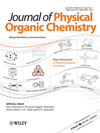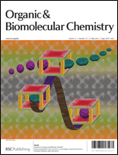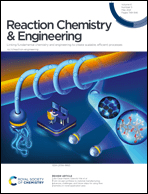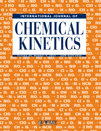
PROGRESS IN REACTION KINETICS AND MECHANISM
Scope & Guideline
Fostering Innovation in Kinetic Studies
Introduction
Aims and Scopes
- Reaction Kinetics Analysis:
The journal emphasizes the quantitative study of reaction rates, providing insights into how variables such as concentration, temperature, and pressure affect the speed of chemical reactions. - Mechanistic Studies:
A core focus is on elucidating the mechanisms of chemical reactions, including the identification of intermediates, transition states, and the pathways through which reactions proceed. - Application of Advanced Computational Methods:
The journal encourages the use of computational chemistry and modeling techniques, such as density functional theory (DFT), to predict and analyze reaction mechanisms and kinetics. - Interdisciplinary Research:
It promotes research that intersects various fields, including materials science, biochemistry, and environmental science, highlighting the relevance of reaction kinetics in practical applications. - Innovative Material Studies:
There is a consistent focus on the interaction of various materials, including nanomaterials and biomaterials, with chemical species, exploring adsorption and reaction behaviors.
Trending and Emerging
- Biomaterials and Adsorption Kinetics:
Recent publications highlight a growing interest in the kinetics of adsorption processes involving biomaterials, reflecting an interdisciplinary approach that bridges chemistry and biological applications. - Nanomaterials and Advanced Materials Science:
There is an increasing emphasis on the study of nanomaterials and their unique properties in reaction kinetics, particularly in terms of their applications in catalysis and environmental remediation. - Entropy and Thermodynamic Considerations:
Emerging research focuses on the role of entropy and thermodynamic principles in reaction kinetics, indicating a deeper exploration of the fundamental laws governing chemical processes. - Complex Reaction Mechanisms:
There is a trend towards investigating complex reaction mechanisms involving multiple components and conditions, enhancing the understanding of intricate chemical interactions. - Integration of Experimental and Theoretical Studies:
A noticeable trend is the combination of experimental data with theoretical models, which enhances the reliability of findings and provides a more comprehensive understanding of reaction kinetics.
Declining or Waning
- Traditional Organic Reaction Mechanisms:
There appears to be a reduction in the publication of studies focusing solely on classical organic reaction mechanisms without the integration of modern computational or interdisciplinary approaches. - Simple Kinetic Studies:
Research centered on basic kinetic studies without complex analysis or innovative applications is less frequently featured, as the journal increasingly favors comprehensive and multifaceted investigations. - Non-Computational Approaches:
There is a noticeable decline in publications that do not utilize advanced computational techniques, indicating a shift towards more sophisticated methods in reaction kinetics research.
Similar Journals

JOURNAL OF PHYSICAL ORGANIC CHEMISTRY
Innovating research in the realm of theoretical chemistry.JOURNAL OF PHYSICAL ORGANIC CHEMISTRY, published by Wiley, serves as a vital platform for researchers and professionals in the fields of organic and physical theoretical chemistry. With a rich history of publication dating back to 1988 and continuing through 2024, this esteemed journal aims to advance the understanding of the physical principles underlying organic reactions and processes. Although it operates without an open access model, the journal maintains a respectable impact factor and has achieved Q3 rankings in both Organic Chemistry and Physical and Theoretical Chemistry as of 2023, affirming its relevance within the scientific community. Researchers looking to publish innovative studies will find a competitive space given its Scopus rankings—placed at #105 in Physical and Theoretical Chemistry and #123 in Organic Chemistry. The journal not only curates high-quality research but also encourages collaboration and the exchange of ideas, making it a cornerstone for anyone dedicated to exploring the complexities of organic materials and their physical interactions.

Reaction Kinetics Mechanisms and Catalysis
Pioneering Research in Kinetics and CatalysisReaction Kinetics Mechanisms and Catalysis is an esteemed academic journal published by SPRINGER, specializing in the fields of catalysis and physical and theoretical chemistry. With ISSN 1878-5190 and E-ISSN 1878-5204, this journal serves as a crucial platform for researchers and professionals to disseminate and engage with cutting-edge findings in reaction kinetics, catalytic processes, and mechanistic insights. Operating under an open access model, the journal ensures broad accessibility to its content, enhancing its impact within the scientific community. As of 2023, it is positioned in the Q4 category in catalysis and Q3 in physical and theoretical chemistry, reflecting its growing influence, yet also its potential for further advancement. Aiming to foster collaborations and innovations, Reaction Kinetics Mechanisms and Catalysis is poised to continue shaping the discourse in its field, making it an essential read for researchers, students, and industry professionals alike.

Central European Journal of Energetic Materials
Advancing the Frontiers of Energetic MaterialsWelcome to the Central European Journal of Energetic Materials, a distinguished publication in the field of energetic materials, published by the INST INDUSTRIAL ORGANIC CHEMISTRY in Poland. This journal, with ISSN 1733-7178, has been a vital platform for researchers since its inception in 2009, promoting the latest advancements and discoveries in the dynamic fields of Materials Chemistry and Organic Chemistry. With an admirable presence in the academic community, it boasts a Q3 ranking in Materials Chemistry and a Q4 ranking in Organic Chemistry for 2023, showcasing its contribution to foundational research despite competitive challenges. Researchers looking to disseminate their findings will find this journal a reputable venue, supported by rigorous peer-review processes and a commitment to open dialogue within the scientific community. The journal is pivotal for academics, professionals, and students interested in the synthesis, characterization, and application of energetic materials, making it a notable resource for understanding the complexities and innovations within this specialized domain.

ORGANIC & BIOMOLECULAR CHEMISTRY
Pioneering discoveries at the intersection of organic and biomolecular chemistry.ORGANIC & BIOMOLECULAR CHEMISTRY is a prestigious academic journal published by the Royal Society of Chemistry, dedicated to advancing the fields of organic and biomolecular chemistry. With its ISSN of 1477-0520 and E-ISSN of 1477-0539, this journal plays a pivotal role in disseminating high-quality research and contributing to the scientific community, particularly in biochemistry, organic chemistry, and physical and theoretical chemistry. Currently ranked in the third quartile for Biochemistry and the second quartile for Organic Chemistry and Physical and Theoretical Chemistry, it caters to a diverse audience of researchers, professionals, and students who seek insightful studies and reviews. With a publication history spanning since 2003 and ongoing till 2024, the journal fosters open access to its articles, encouraging the free exchange of knowledge. Situated in the vibrant academic environment of Cambridge, UK, ORGANIC & BIOMOLECULAR CHEMISTRY serves as a vital resource for innovative research at the intersection of chemical sciences.

HELVETICA CHIMICA ACTA
Pioneering Insights in Biochemistry and BeyondHELVETICA CHIMICA ACTA, published by WILEY-V C H VERLAG GMBH, stands as a pivotal journal in the fields of chemistry and chemical research. Established in 1918, this esteemed journal spans a diverse array of topics, including biochemistry, catalysis, drug discovery, inorganic and organic chemistry, as well as physical and theoretical chemistry. With influence reflected in its noteworthy Q2 and Q3 quartile rankings across these categories as of 2023, HELVETICA CHIMICA ACTA continues to capture the interest of the global scientific community. Although not an open-access journal, it remains accessible through various academic institutions, ensuring broad reach and collaboration opportunities. Researchers, professionals, and students alike will find its meticulously peer-reviewed articles critical for advancing knowledge and fostering innovation within the chemical sciences. As the journal converges toward 2024, it remains committed to publishing high-quality, impactful research that supports the evolution of chemistry across its multifaceted disciplines.

STRUCTURAL CHEMISTRY
Transforming Understanding through Structural AnalysisSTRUCTURAL CHEMISTRY is a premier journal published by SPRINGER/PLENUM PUBLISHERS, dedicated to advancing the study and understanding of the structural aspects of chemistry. With an ISSN of 1040-0400 and an E-ISSN of 1572-9001, this journal serves as a critical resource for researchers and professionals engaged in the fields of Condensed Matter Physics and Physical and Theoretical Chemistry. Since its inception in 1990, it has become an essential platform for disseminating high-quality research, featuring articles that explore innovative methodologies, experimental techniques, and theoretical frameworks. As evidenced by its Scopus rankings, including #192 in Condensed Matter Physics and #101 in Physical and Theoretical Chemistry, the journal occupies a respected position within the academic community, promoting interdisciplinary collaboration and insight. While it operates on a traditional subscription model, the journal continues to broaden its reach to foster knowledge exchange among scholars worldwide. With a commitment to excellence and relevance, STRUCTURAL CHEMISTRY remains a vital contributor to the scientific dialogue surrounding chemical structure and its myriad implications across various scientific disciplines.

ACTA CHIMICA SINICA
Unveiling the Future of Chemistry through Rigorous ResearchACTA CHIMICA SINICA, published by SCIENCE PRESS, is a distinguished peer-reviewed journal in the realm of Chemistry, specifically focusing on general and miscellaneous chemistry fields. Since its inception in 1982, the journal has consistently contributed to the advancement of chemical research in China and beyond, maintaining a reputable standing within the academic community, evidenced by its 2023 Scopus ranking of #197 out of 408 in its category. With a current impact factor placing it in the Q3 quartile, ACTA CHIMICA SINICA aims to disseminate innovative research findings, covering a wide spectrum of topics within the discipline. Although it is not an open-access journal, it offers various access options through institutional subscriptions, ensuring that its high-quality content is available to a broad audience. Researchers, professionals, and students alike will find this journal a vital resource for keeping abreast of developments in the field and for contributing their own findings to an engaged scientific community.

Reaction Chemistry & Engineering
Driving Progress in Catalysis and BeyondReaction Chemistry & Engineering is an esteemed journal published by the Royal Society of Chemistry, dedicated to advancing the field of chemical engineering. With a focus on pivotal topics including catalysis, process technology, and fluid flow, this journal serves as a critical platform for researchers and professionals seeking to disseminate innovative findings and methodologies. As of 2023, it boasts impressive impact factors, ranking Q2 in Catalysis and consistently appearing in the Q1 categories for several related fields, thus recognizing its influence and relevance in the scientific community. With Scopus rankings placing it among the top 30 journals in multiple chemical engineering categories, Reaction Chemistry & Engineering encourages open dialogue and collaboration among scientists aiming to overcome contemporary challenges in chemical processes. This journal is vital for anyone involved in the development and application of chemical engineering, providing essential insights and fostering progress in this dynamic discipline. Explore the latest research and contribute to future innovations by engaging with the cutting-edge work presented in Reaction Chemistry & Engineering.

INTERNATIONAL JOURNAL OF CHEMICAL KINETICS
Unraveling the complexities of reaction kinetics.The INTERNATIONAL JOURNAL OF CHEMICAL KINETICS, published by Wiley, is a leading journal that covers significant advancements and fundamental research in the field of chemical kinetics. Established in 1969, this peer-reviewed journal not only emphasizes kinetics in solution and gas-phase reactions but also addresses theoretical approaches and experimental applications in various branches of chemistry including biochemistry, inorganic chemistry, organic chemistry, and physical chemistry. As of 2023, it holds a respectable Q2 ranking in Inorganic Chemistry and Q3 in the other chemistry categories, reflecting its substantial impact on the scientific community. With a commitment to disseminating high-quality research, the journal is an indispensable resource for researchers, educators, and students seeking to deepen their understanding of chemical dynamics. Its compilation of articles and reviews ensures that it remains a cornerstone for innovative studies and discussions within the field.

Computational and Theoretical Chemistry
Bridging Disciplines for a Sustainable Scientific FutureComputational and Theoretical Chemistry, published by ELSEVIER, stands at the forefront of interdisciplinary research in the realms of computational chemistry, theoretical physics, and biochemistry. With its ISSN 2210-271X and E-ISSN 1872-7999, the journal has established a significant presence in the academic community since its inception. Covering innovative computational methodologies and theoretical advancements, it addresses critical issues in condensed matter physics and molecular biochemistry, providing a rich resource for scholars and industry professionals alike. The journal enjoys a respectable impact factor and ranks notably in several Scopus categories, making it a vital platform for disseminating high-quality research. It adopts an open-access model, facilitating wider readership and engagement, which is essential for fostering collaborative innovations in the scientific landscape. As it continues to evolve from 2011 to 2024, Computational and Theoretical Chemistry is committed to advancing knowledge and promoting insightful discussions within the scientific community.